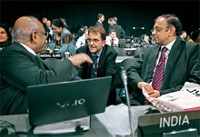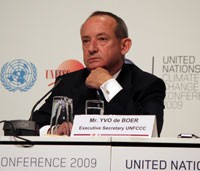Advertisement
Grab your lab coat. Let's get started
Welcome!
Welcome!
Create an account below to get 6 C&EN articles per month, receive newsletters and more - all free.
It seems this is your first time logging in online. Please enter the following information to continue.
As an ACS member you automatically get access to this site. All we need is few more details to create your reading experience.
Not you? Sign in with a different account.
Not you? Sign in with a different account.
ERROR 1
ERROR 1
ERROR 2
ERROR 2
ERROR 2
ERROR 2
ERROR 2
Password and Confirm password must match.
If you have an ACS member number, please enter it here so we can link this account to your membership. (optional)
ERROR 2
ACS values your privacy. By submitting your information, you are gaining access to C&EN and subscribing to our weekly newsletter. We use the information you provide to make your reading experience better, and we will never sell your data to third party members.
Environment
Copenhagen Consternation
Climate Change: Nonbinding deal lets countries make their own pledges on greenhouse gas limits
by Jeff Johnson And Cheryl Hogue
December 23, 2009

The United Nations-sponsored Copenhagen conference on climate change came to an end with more of a whimper than the bang that was anticipated at the start.
Two weeks of debating, posturing, protesting, and round-the-clock negotiations yielded only a three-page, nonbinding accord, reached on Dec. 18. It sets a nonbinding goal of holding average global temperature rise to the level needed to stop the worst impact of climate change, and it contains a pledge for the industrialized world to set aside future mitigation funds to help developing nations adapt to climate change.
The nations of the world are now left to sign on to the accord and make individual pledges to reduce their greenhouse emissions. However, not all countries are accepting the new climate-change deal that was brokered in large part by President Barack Obama in an 11th-hour negotiating session. So far, about 30 nations have pledged.
Obama hammered out the nonbinding political deal late on Dec. 18 after consulting with the leaders of China, India, Brazil, and South Africa—countries with emerging economies and fast-growing greenhouse gas emissions. The pact says the world should hold human-induced average global warming below 2 °C and calls for developed nations to provide $30 billion per year, beginning in 2010 and running until 2012, to aid developing countries in mitigating the impact of climate change. That total would ramp up to some $100 billion by 2020. Where the money will come from is unclear.
"We have sealed the deal," said UN Secretary General Ban Ki-moon, who pushed world leaders hard through 2009 to get a legally binding climate-change treaty completed in Copenhagen. "This accord cannot be everything that everyone hoped for, but it is an essential beginning," he said. Although most other nations embraced the pact, several developing countries, including Sudan and Venezuela, resisted the deal in large part because they weren't involved in negotiating it.
Whether the accord fits into the UN-sponsored climate-change negotiations is also unclear. As negotiations spilled past the UN-set deadline of Dec. 18 and into an unscheduled day of further discussions on Dec. 19, the official UN Climate Change Conference "took note" of the new Copenhagen Accord, but did not officially adopt it.
Yvo de Boer, the UN's top climate-change official, was circumspect and told reporters that countries "want to take the initiative to sign up themselves" when endorsing the political agreement. Danish Prime Minister Lars LØkke Rasmussen, who convened the heads of state for the negotiations, will invite nations to endorse the Copenhagen Accord, de Boer added. A number of developing countries have objected to the UN taking on the job of accepting signatures because the pact was not the product of that organization's negotiations.
Obama emphasized the precedence of the new accord. "For the first time in history, all major economies have come together to accept their responsibility to take action to confront the threat of climate change," Obama told reporters in Copenhagen. The actions spelled out in the agreement "will not be by themselves sufficient to get to where we need to get," Obama acknowledged, calling it a first step.
"It will not be legally binding," Obama pointed out. Nonetheless, it will "allow for each country to show to the world what they're doing," he said. "There will be a sense on the part of each country that we're in this together, and we'll know who is meeting and who's not meeting the mutual obligations."
Environmental groups also noted the accord's nonbinding nature and added that it lacks targets and deadlines for cutting greenhouse gas emissions. Countries are expected to resume climate negotiations in 2010, with the goal of finishing a legally binding treaty that requires specific emission cuts by next December.
"The world's nations have come together and concluded a historic—if incomplete—agreement to begin tackling global warming," said Carl Pope, executive director of the Sierra Club, an environmental organization. "Much work remains to be done in the days and months ahead in order to seal a final international climate deal that is fair, binding, and ambitious."
But the accord will set the stage for the U.S. Senate's passage of a clean energy and climate-change bill, according to Sen. John F. Kerry (D-Mass.), chairman of the Senate Foreign Relations Committee. Kerry said that seeing Obama, Chinese Premier Wen Jiabao, Indian Prime Minister Manmohan Singh, and South African President Jacob Zuma agree to address climate change was "a powerful signal." He called the leaders "the four horsemen of a climate-change solution."
A legislator from across the Atlantic sees things differently. European Parliament President Jerzy Buzek said, "There are some positive elements to the agreement, but the European Union should continue to put pressure on the rest of the world to reach a more ambitious agreement at a later stage."
Eyes will now turn to Mexico, where the next round of UN climate-change negotiations is scheduled to take place in November, although there are calls for the talks to take place earlier, in the summer of 2010. Hopes are that a new global, legally binding climate-change treaty will emerge from those discussions.




Join the conversation
Contact the reporter
Submit a Letter to the Editor for publication
Engage with us on Twitter